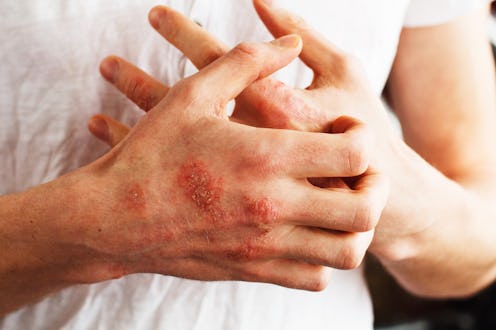Life
5 Ways To Calm Psoriasis In The Summer, Because The Sun Isn't Always Skin-Friendly

Most people think the winter is the worst time for psoriasis, but summer can be just as irritating for the skin condition. Characterised by scaly or flaky patches of skin, some sufferers may experience slight itchiness every now and then. But for others, the condition can be a major problem — especially when aggravated by sweating, chlorine, and air conditioning. Keep reading for five ways to calm a psoriasis flare-up in the summer.
According to the NHS, psoriasis tends to develop in people under the age of 35. Its cause? Increased skin cell production. Where the average body replaces skin cells every three to four weeks, a person with psoriasis does the same every three to seven days.
Unfortunately, there is no cure. But there are plenty of ways to calm the condition and to treat it if symptoms get too severe. These range from topical creams to UV light therapy and even injections. A GP or dermatologist will advise the best course of treatment.
Psoriasis can be seasonal. While many find their skin worsens in the winter, some find that sweat and air con cause irritation. If you're struggling with itchy, dry patches this summer, try the following techniques to keep things feeling cool.
1Stay Safe In The Sun
While sunlight can be beneficial for psoriasis, sunburn most definitely isn't. Avoid burning your skin by staying in the shade during the hottest parts of the day and properly applying sunscreen.
Around six teaspoons is the amount required to cover the face and body of an adult, according to the British Association of Dermatologists. Apply it around 30 minutes before stepping outside and again once you're in direct sunlight. And don't forget to reapply every two hours or immediately after sweating, swimming, or drying off with a towel.
2Keep Moisturising
A good moisturiser is the enemy of psoriasis. Opt for heavier creams that will lock in moisture; a dermatologist or pharmacist can usually advise an effective product. A review published in the Indian Journal of Dermatology also recommended moisturisers containing mineral oils.
There are a couple of home remedies to try too, although these may provide mixed results. As Medical News Today states, two popular options are aloe vera gel and coconut oil.
3Avoid Hot Showers
Hot water may increase irritation and dryness. Instead, try having a cold shower that lasts for no longer than 10 minutes, advises the National Psoriasis Foundation. You can also apply an ice pack to any particularly troublesome patches.
If you'd prefer a bath, keep it at a cool or lukewarm temperature and add the likes of milk, mineral oil, or Epsom salts to soothe your skin, reports Healthline.
4Watch Your Diet
When the summer hits, a healthy diet can easily slip out the window. But certain foods can trigger a psoriasis flare-up. Alcohol can contribute to inflammation, along with red meat, carbohydrates, saturated fat, and refined sugars, notes Healthline.
If you can't cut these out completely, consume as little as you can and bulk up on the healthy stuff: fish, nuts, and omega 3 fatty acids.
5Manage Your Stress Levels
If you've been struggling to work out what causes a fresh bout of psoriasis, take a look at your stress levels. Constantly worrying? This could be to blame for flare-ups in around 68 percent of adults, reports an article in the Indian Journal of Psychiatry.
Reducing stress is difficult, but there are a few tried and tested ways to calm down, notes the National Psoriasis Foundation. Try meditating for 15 minutes each day, closing your eyes and focusing on your breathing. Alternatively, you can try exercising regularly or speaking to a professional therapist.
6
If your symptoms show no signs of improvement and begin to have a major impact on your life, don't hesitate to book a doctor's appointment.